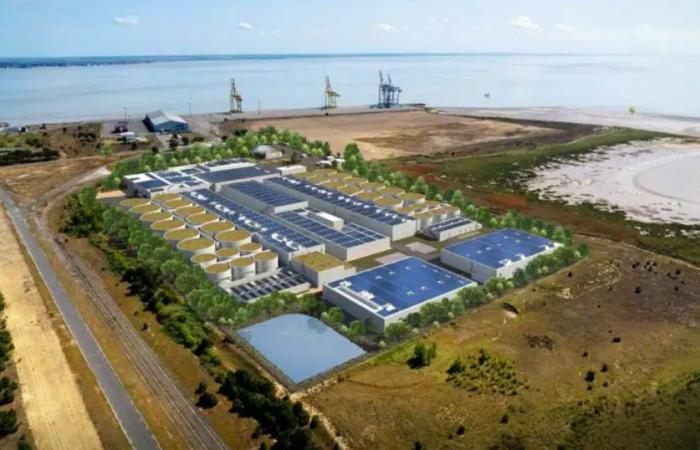After an initial unfavorable opinion, the local water commission finally changed its mind, giving its approval to this project for a factory covering several hectares for the breeding and preparation of salmon in the Gironde estuary. .
Le Figaro Bordeaux
It’s a gigantic project that seemed to be taking on water from all sides. In Verdon-sur-Mer, north of the Gironde estuary, the company Pure Salmon wishes to install the largest salmon farm in Europe in order to produce 10,000 tonnes per year from 2026, or 5% of the French consumption. A project criticized by many scientists and concerned residents as well as elected environmentalists and La France Insoumise. After several setbacks, the project has just received a first green light.
In a notice published on May 17, the local water commission (CLE) considers that this exploitation project “could be deemed compatible with the SAGE [Schéma d’aménagement et de gestion des eaux] subject to the results of the expertise, by the BRGM [Bureau de recherches géologiques et minières]announced impacts on the confined Plio-Quartenary aquifer”. Behind this jargon, the CLE believes that this project, which will require the withdrawal of significant quantities of water, would therefore have no impact on groundwater.
An “inordinate density” of salmon
The CLE thus returns to its opinion given six months earlier, in which the studies provided by the company – to prove that its drilling in the surface water table would not weaken the groundwater table – had been judged to be incomplete. The commission nevertheless specifies that “inconsistencies remain” and that’“a certain number of questions remain unanswered”. The mega-factory is therefore still far from being built, especially since the mobilization against this major project is not weakening. A petition, launched by the Eaux Secours Agissons association, has already gathered around 57,000 signatures.
This organization believes that the future factory farm would be a danger for the environment – it fears potential releases of contaminated water into the Gironde estuary, a unique and precious ecosystem classified as a Natura 2000 zone – but also for the animal condition. , with a “excessive density” to produce 10,000 tonnes of salmon (four million fish per year), in a building of only 7.5 hectares. She further highlights the risks associated with intensive farming, in which animals are under stress and can more easily be decimated by diseases.
Eaux Secours Agissons also questions the energy consumption of the factory as well as its high demand for water, “even though the Médoc is in areas of water stress ». The employment argument, which rallied certain Gironde elected officials to this project, has also been undermined, with opponents believing that “thousands of local jobs are in danger for a few hundred jobs to be filled”fearing that jobs linked to tourism, local fishing and oyster farming would disappear in the surrounding areas.
A SLAPP procedure initiated
To silence these oppositions, Pure Salmon resorted to a SLAPP procedure, a legal action taken by certain large companies in order to intimidate or silence activists, journalists, whistleblowers or political opponents. This defamation trial was unsuccessful, since in December, the activists won their case. The company, however, announced that it would appeal the court’s decision. For Emergency Water Let’s Act, “the incriminated remarks arise from a debate of opinion and the right to free criticism” and contain “terms imbued with measurement”Who “do not harm the honor and consideration of the Pure Salmon company”.
“The carrier ensures pure waste water. We consider this to be misleading and dishonest, because he himself indicates that there will be traces of pesticides”, remind the activists. According to them, “the plant will discharge 3,500 cubic meters of water per day potentially additionally loaded with growth hormones, antibiotics and organic matter”. They point out that the estuary is connected to the ocean and that this project could therefore “change an entire landscape, an entire ecosystem”, affecting water and groundwater. Despite this first fairly favorable opinion, the Pure Salmon file risks being talked about again before it succeeds in complying with the regulations on installations classified for environmental protection (ICPE).






